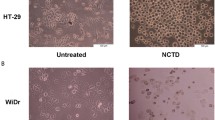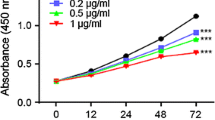Abstract
Colon cancer is one of the most familiar malignancies worldwide, with high morbidity and high mortality. This study intended to explore the role and mechanism of tectoridin (TEC) in regulating the progression of colon cancer. First, colon cancer cell lines (HCT116 and SW480 cells) were treated with different doses of TEC (0–200 μM). Then, CCK8 and clone formation experiments were performed to detect cell proliferation. Flow cytometry and western blot were conducted to examine apoptosis. Subsequently, Transwell assay and wound-healing test was employed to determine the effect of TEC on colon cancer cell invasion and migration. Next, western blot was performed to monitor the PKC/p38 MAPK pathway activation. In addition, a tumor model was established in nude mice to explore the effect of TEC on tumor growth in vivo. TEC dose-dependently dampened the proliferation, migration and invasion of colon cancer cells and facilitated their apoptosis. In addition, TEC abated the tumor cell growth in vivo. Besides, TEC dose-dependently suppressed the expression of PKC and p38 MAPK. Moreover, inhibiting the PKC pathway almost cancel out the anti-tumor effects induced by TEC. TEC attenuates the colon cancer progression by inhibiting the PKC/p38 MAPK pathway.






Similar content being viewed by others
Data availability
The data sets used and analyzed during the current study are available from the corresponding author on reasonable request.
References
Li SS, Zhu HJ, Li JY, Tian LM, Lv DM (2020) MiRNA-875-3p alleviates the progression of colorectal cancer via negatively regulating PLK1 level. Eur Rev Med Pharmacol Sci 24(3):1126–1133
Guan SS, Wu CT, Liao TZ, Luo TY, Lin KL, Liu SH (2020) Indium-111-labeled CD166-targeted peptide as a potential nuclear imaging agent for detecting colorectal cancer stem-like cells in a xenograft mouse model. EJNMMI Res 10(1):13
Rejhová A, Opattová A, Čumová A, Slíva D, Vodička P (2018) Natural compounds and combination therapy in colorectal cancer treatment. Eur J Med Chem 144:582–594
Wong W, Chen BZ, Lee A, Chan A, Wu J, Lin Z (2019) Chinese herbal medicine effectively prolongs the overall survival of pancreatic cancer patients: a case series. Integr Cancer Ther 18:1534735419828836
Meng H, Peng N, Yu M, Sun X, Ma Y, Yang G, Wang X (2017) Treatment of triple-negative breast cancer with Chinese herbal medicine: a prospective cohort study protocol. Medicine 96(44):e8408
Peng F, Xie X, Peng C (2019) Chinese herbal medicine-based cancer therapy: novel anticancer agents targeting micrornas to regulate tumor growth and metastasis. Am J Chin Med 47(8):1711–1735
Yang M, Yang X, An J, Xiao W, Wang Z, Huang W, Yang Z, Li F (2015) Comparative pharmacokinetic profiles of tectorigenin in rat plasma by UPLC-MS/MS after oral administration of Iris tectorum Maxim extract and pure tectoridin. J Pharm Biomed Anal 114:34–41
Han T, Cheng G, Liu Y, Yang H, Hu YT, Huang W (2012) In vitro evaluation of tectoridin, tectorigenin and tectorigenin sodium sulfonate on antioxidant properties. Food Chem Toxicol 50(2):409–414
Lee HU, Bae EA, Kim DH (2005) Hepatoprotective effect of tectoridin and tectorigenin on tert-butyl hyperoxide-induced liver injury. J Pharmacol Sci 97(4):541–544
Lee YS, Kim SH, Kim JK, Lee S, Jung SH, Lim SS (2011) Preparative isolation and purification of seven isoflavones from belamcanda chinensis. Phytochem Anal 22(5):468–473
Jung SH, Lee YS, Lee S, Lim SS, Kim YS, Ohuchi K, Shin KH (2003) Anti-angiogenic and anti-tumor activities of isoflavonoids from the rhizomes of belamcanda chinensis. Planta Med 69(7):617–622
Guo C, Yang XG, Wang F, Ma XY (2016) IL-1α induces apoptosis and inhibits the osteoblast differentiation of MC3T3-E1 cells through the JNK and p38 MAPK pathways. Int J Mol Med 38(1):319–327
Sun Y, Liu WZ, Liu T, Feng X, Yang N, Zhou HF (2015) Signaling pathway of MAPK/ERK in cell proliferation, differentiation, migration, senescence and apoptosis. J Recept Signal Transduct Res 35(6):600–604
Smalley T, Metcalf R, Patel R, Islam S, Bommareddy RR, Acevedo-Duncan M (2020) The atypical protein kinase c small molecule inhibitor ζ-stat, and its effects on invasion through decreases in pkc-ζ protein expression. Front Oncol 10:209
Ye L, Hong F, Ze X, Li L, Zhou Y, Ze Y (2017) Toxic effects of TiO2 nanoparticles in primary cultured rat sertoli cells are mediated via a dysregulated Ca2+ /PKC/p38 MAPK/NF-κB cascade. J Biomed Mater Res 105(5):1374–1382
Park J, Kim SH, Cho D, Kim TS (2005) Formononetin, a phyto-oestrogen, and its metabolites up-regulate interleukin-4 production in activated T cells via increased AP-1 DNA binding activity. Immunology 116(1):71–81
Guan X, Zheng X, Vong CT, Zhao J, Xiao J, Wang Y, Zhong Z (2020) Combined effects of berberine and evodiamine on colorectal cancer cells and cardiomyocytes in vitro. Eur J Pharmacol 875:173031
Xiong Y, Yang Y, Yang J, Chai H, Li Y, Yang J, Jia Z, Wang Z (2010) Tectoridin, an isoflavone glycoside from the flower of Pueraria lobata, prevents acute ethanol-induced liver steatosis in mice. Toxicology 276(1):64–72
Qu J, Wu Z, Gao J, Wen H, Wang T, Yuan D (2014) Excretion of tectoridin metabolites in rat urine and bile orally administrated at different dosages and their inhibitory activity against aldose reductase. Fitoterapia 99:99–108
Kim YP, Yamada M, Lim SS, Lee SH, Ryu N, Shin KH, Ohuchi K (1999) Inhibition by tectorigenin and tectoridin of prostaglandin E2 production and cyclooxygenase-2 induction in rat peritoneal macrophages. Biochem Biophys Acta 1438(3):399–407
Lee KT, Sohn IC, Kim YK, Choi JH, Choi JW, Park HJ, Itoh Y, Miyamoto K (2001) Tectorigenin an isoflavone of pueraria thunbergiana benth, induces differentiation and apoptosis in human promyelocytic leukemia HL-60 cells. Biol Pharm Bull 24(10):1117–1121
Wang Q, Cheng XL, Li H, Qin XY, Ge CY, Liu R, Qi LW, Qin MJ (2013) Application of an efficient strategy for discovery and purification of bioactive compounds from Chinese herbal medicines, a case study on the puerariae thomsonii flos. J Pharm Biomed Anal 75:25–32
Pandey V, Bhaskara VK, Babu PP (2016) Implications of mitogen-activated protein kinase signaling in glioma. J Neurosci Res 94(2):114–127
Martínez-Limón A, Joaquin M, Caballero M, Posas F, de Nadal E (2020) The p38 pathway: from biology to cancer therapy. Int J Mol Sci 21(6):1913
An JN, Yang SH, Kim YC, Hwang JH, Park JY, Kim DK, Kim JH, Kim DW, Hur DG, Oh YK, Lim CS, Kim YS, Lee JP (2019) Periostin induces kidney fibrosis after acute kidney injury via the p38 MAPK pathway. Am J Physiol Renal Physiol 316(3):F426–F437
Zhang Y, Tian Z, Wan H, Liu W, Kong F, Ma G (2020) Deltonin Ameliorates cerebral ischemia/reperfusion injury in correlation with modulation of autophagy and inflammation. Neuropsychiatr Dis Treat 16:871–879
Chien MH, Yang WE, Yang YC, Ku CC, Lee WJ, Tsai MY, Lin CW, Yang SF (2020) Dual targeting of the p38 MAPK-HO-1 axis and cIAP1/XIAP by demethoxycurcumin triggers caspase-mediated apoptotic cell death in oral squamous cell carcinoma cells. Cancers 12(3):703
Xu C, Wang Y, Feng J, Xu R, Dou Y (2019) Extracts from Huangqi (Radix astragali mongoliciplus) and Ezhu (Rhizoma Curcumae phaeocaulis) inhibit Lewis lung carcinoma cell growth in a xenograft mouse model by impairing mitogen-activated protein kinase signaling, vascular endothelial growth factor production, and angiogenesis. J Tradit Chin Med 2019(39):559–565
Liu WS, Heckman CA (1998) The sevenfold way of PKC regulation. Cell Signal 10(8):529–542
Kim H, Kim SH, Hwang D, An J, Chung HS, Yang EG, Kim SY (2020) Extracellular pyruvate kinase M2 facilitates cell migration by upregulating claudin-1 expression in colon cancer cells. Biochem Cell Biol 98(2):219–226
Dükel M, Tavsan Z, Erdogan D, Erkan Gök D, Ayar Kayali H (2019) Protein kinase C Inhibitors selectively modulate dynamics of cell adhesion molecules and cell death in human colon cancer cells. Cell Adhes Migr 13(1):83–97
Antal CE, Hudson AM, Kang E, Zanca C, Wirth C, Stephenson NL, Trotter EW, Gallegos LL, Miller CJ, Furnari FB, Hunter T, Brognard J, Newton AC (2015) Cancer-associated protein kinase C mutations reveal kinase’s role as tumor suppressor. Cell 160(3):489–502
Newton AC (2018) Protein kinase C: perfectly balanced. Crit Rev Biochem Mol Biol 53(2):208–230
Kim TH, Yoon JH, Cho SG (2020) Kisspeptin promotes glioblastoma cell invasiveness via the Gq-PLC-PKC pathway. Anticancer Res 40(1):213–220
Li C, Li Y, Sui L, Wang J, Li F (2019) Phenyllactic acid promotes cell migration and invasion in cervical cancer via IKK/NF-κB-mediated MMP-9 activation. Cancer Cell Int 19:241
Hu HJ, Deng XW, Li RX, Chen DW, Xue C (2019) Inhibition of protein kinase C activity inhibits osteosarcoma metastasis. Arch Med Sci 15(4):1028–1034
Kamo N, Shen XD, Ke B, Busuttil RW, Kupiec-Weglinski JW (2011) Sotrastaurin, a protein kinase C inhibitor, ameliorates ischemia and reperfusion injury in rat orthotopic liver transplantation. Am J Transplant 11(11):2499–2507
Funding
This work was supported by Hubei Province health and family planning scientific research Project 2018 (No. WJ2018H0097).
Author information
Authors and Affiliations
Contributions
Conceived and designed the experiments: WG; Performed the experiments: LX, WG; Wrote the paper: LX, WG. All authors read and approved the final manuscript.
Corresponding author
Ethics declarations
Conflict of interest
The authors declare that they have no competing interests.
Ethical approval
Our study was approved by the Ethics Review Board of China Resources & WISCO General Hospital Affiliated to Wuhan University of Science and Technology.
Additional information
Publisher's Note
Springer Nature remains neutral with regard to jurisdictional claims in published maps and institutional affiliations.
Supplementary Information
Below is the link to the electronic supplementary material.
Rights and permissions
About this article
Cite this article
Xiong, L., Guo, W., Yang, Y. et al. Tectoridin inhibits the progression of colon cancer through downregulating PKC/p38 MAPK pathway. Mol Cell Biochem 476, 2729–2738 (2021). https://doi.org/10.1007/s11010-021-04081-w
Received:
Accepted:
Published:
Issue Date:
DOI: https://doi.org/10.1007/s11010-021-04081-w




